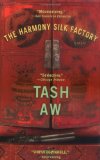
This ought to be an interesting book: a kind of Rashomon redux. Three views of the same man, a Malaysian Chinese businessman and Communist organizer named Johnny Lim, by three narrators, his son, Jasper; his wife, Snow Soong; and his friend(?), Peter Wormwood(!). But the narration scheme fails to deliver what it promises. On the one hand, the author purports to show the reader Johnny Lim from these three distinct, and arguably equally valid standpoints; but the narration attributed to his son, Jasper, reveals things that Jasper could not know, could not have learned, and probably would not have presumed to invent about what went on in Johnnys mind. At least in Rashomon the characters told what they saw and did (or what they thought or would like to think they saw and did). Here, the three narrations feel unreliable because the author doesnt obey the conventions of his own device.
The story also suffers from inexplicable and thus unbelievable plot devices. What would ever possess anyone to characterize a trip to undeveloped, uninhabited islands in the Straights of Malacca as a honeymoon? What would possess the brides father to suggest such a trip? And what would possess a man to set out with his wife on such a honeymoon in the company of three other men: Peter, another Englishman (surnamed Honey), and a Japanese, Kunichika (whom we already know from Jaspers narrative will be the evil Japanese master of occupied Malaysia)?
The least believableand perhaps the other side of the same cointhe least comprehensible of the three narrators is Peter Wormwood, who comes across as an effete, misfit British expatriate. His narrative asserts that he was in love (and he certainly was besotted) with Snow, but the sexual proclivities he acts on lead to commercial sex with a transvestite.
Peters obsession with gardens and the importation or not of foreign plant species is of minor didactic interest, but hardly compelling. Presumably the author wanted to freight the issue with symbolic overtones of cultural imperialism and subsequent adoption of aspects of colonial culture into the post-colonial state, but I wasnt engaged and I tried to fast-forward over those parts.
The novel is fraught with a skittish avoidance of sex. The eponymous Harmony Silk Factory run by Johnny Lim is said to include brothel services, but aside from providing Johnnys sons with one more reason to despise his father, nothing is made of the fact. Peter reports, with neither enthusiasm nor regret, having (clearly sexual) encounters with a Master at the school he attended, and he reports a brief episode in which he engages the services of a local transvestite prostitute for an unsatisfying quickie. Kunichika attempts to rape Snowit seems a tad odd that she resists him because she has apparently decided to leave Johnny for him. Peters subsequent I-dont-know-how-to-characterize-it bout with Snow seems to have been Snows one and only experience of sexual intercourse, although Snows narrative is unclear about what did or didnt actually transpire. Is Peters version of what happened after he saved Snow from Kunichika the feverish concoction of a mind only tenuously in touch with reality? Weird.
Peters character seems stereotypically homosexual, as does Johnny in both Snows and Peters narrative. Johnny and Peter seem smitten with one another, but they never seem to act or have acted upon the feeling. (Is there some idealistic appeal here to the sanctifying properties of Platonic love?) The idea that Peter falls in love with Snowthat he could even consider falling in love with Snowborders on ludicrous. At best, he seems to be in love with the idea of being in love with Snow. His physical description of Snow, daughter of the richest man in the Kinta valley and reportedly the most beautiful woman there, makes her seem androgynous like a male transvestite (she is tall, solidly built, without much feminine shape), so at least Peter is minimally consistent in his preferences.
There is lots of local color, but the setting doesnt thrust itself forward to become a character in its own right as it does in The Hamilton Case. Even so, the English come off worse in this novel than they do in The Hamilton Case., in which there is some admiration for the legal system and the courts the English brought to Sri Lanka. In The Harmony Silk Factory, The English tin barons (not to be confused with tin soldiers) are so thoroughly incompetent that when their mining machinery breaks down, they dont believe its really broken and simply blame the workers. Theres no sense of a functioning government or administrative system. Everything feels like a jungle outpost.
These two views, I suppose, are the British colonies equivalent of the two views of the Spanish in Latin America: the leyenda blanca (the white legend) that holds that whatever else the Spanish did, they introduced some reasonable governmental and administrative institutions, and the leyenda negra (the black legend) that holds that the Spanish sullied everything they touched, and bequeathed nothing of value.
In the end, theres not much to say about the story, because in spite of the novels 377 pages, there isnt much of a story. As a character study, its hard to believe in any of the characters at all. They strut and fret their hour upon the stage, but they are oh so easy to forget. Except, maybe, poor, benighted Snow. But, for all that I felt annoyed at the end, I was glad to have read the book. It failed, but it failed with chutzpah!